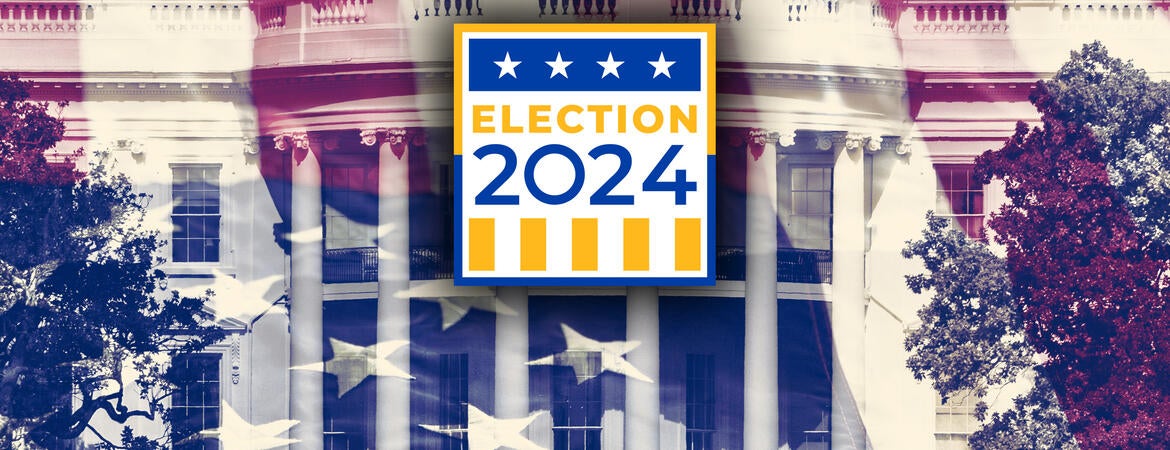
A couple weeks back, the 2024 presidential race was upended by the decision of President Joe Biden not to seek reelection. Since then, political pundits have scrambled to assess the new Harris-Trump dynamic. The dust is settling on a flurry of polls, and we asked UCR polling and survey expert Andy Crosby, an assistant professor in the School of Public Policy, to weigh in on trends. He approached his assessment below from the perspectives of Harris’ introduction to the race; the effect of JD Vance as the GOP’s vice presidential choice, and the importance of considering trends not in the popular vote, but in the electoral college vote.
The Introduction of VP Harris
One of the largest stories in polling has been President Biden announcing he would not continue his bid for re-election and his endorsement of Vice President Kamala Harris as his replacement on the Democratic ticket.
Overall, the race remains close. A recent New York Times/Siena College poll conducted July 22-24 shows that Donald Trump has a slight lead over Vice President Kamala Harris, with 48% of respondents indicating they would vote for Trump if the election were held today, compared to 47% of respondents that indicated they would vote for Harris. These results are within the poll’s margin of error of 3.3%.
One of the changes we have seen is an increase in Vice President Harris’ favorability in the polls recently. In an ABC News/Ipsos poll released on Sunday, 43% of respondents reported having a favorable view of Harris, compared to just 35% one week ago. Harris’ favorability rating is also now higher than both President Joe Biden (37%) and former President Donald Trump (36%). A large majority of Democrats are also enthusiastic about Harris’ candidacy: 88% of respondents reported being either “very enthusiastic” or “somewhat enthusiastic” about Harris’ candidacy.
Although Vice President Harris is almost certain to be the Democratic nominee, keep in mind that she has only been campaigning for just over one week, and we may see some movement in the polls over the coming weeks as voters get to know her more and we potentially see a presidential debate. In addition, Vice President Harris will also soon announce her running mate, and her running mate may also have something of an effect on polls, particularly in certain states that are the home state of a potential running mate (more on that below).
The Introduction of Sen. JD Vance
In addition to Vice President Harris, we also have another newcomer to our political polling for the presidential election: Republican vice-presidential candidate Senator JD Vance of Ohio. The New York Times/Siena College poll mentioned above shows slightly more respondents viewing Vance unfavorably than favorably (36% favorable, 40% unfavorable). In the ABC News/Ipsos poll mentioned above, which is slightly more recent, 24% of respondents indicated they had a favorable opinion of Vance, and 39% indicated they had an unfavorable opinion. Notably, a considerable portion of respondents in the ABC News/Ispos poll responded that they either had no opinion of Vance (17%) or they did not know (19%). Like Harris, we may see movement in these results as voters get to know Vance more and we may potentially see a televised debate featuring him and the Democratic vice-presidential nominee.
The States, the States, the States
You might be wondering: what should someone make of all of this recent polling data? A well-known saying from the late Tim Russert in the 2000 Presidential Election was “Florida, Florida, Florida,” written on a small board in marker and referring to the fact that the presidential election that year would come down to the votes in just one state. If there is one single thing that I would emphasize 100 days out until the November election, it is the importance of watching polling in individual states. Although national polls are interesting to watch and may inform us of how the country overall is feeling, we also need to keep in mind that we do not elect presidents on a national basis in the United States. Instead, we use the Electoral College. Because of this, watching individual state polls – particularly battleground states such as Arizona, Georgia, Michigan, Pennsylvania, and Wisconsin – may be more useful to predict the election than national polls. We are just starting to see Vice President Harris included in these state polls.
The importance of battleground states is also one reason that Vice President Harris may select a running mate who is popular in a battleground state, such as Sen. Mark Kelly of Arizona or Gov. Josh Shapiro of Pennsylvania. Although these potential vice-presidential candidates do not register large percentages of either favorable or unfavorable views at this point in the race, this is mostly because they are not as well-known outside of their home states. That will likely change once voters get to know the candidate.
With less than 100 days to go, keep your eyes on the states!




